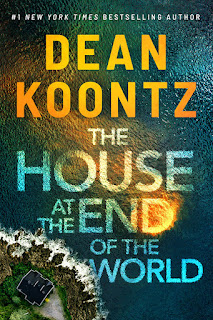By Mike Mastromatteo | OSV News
(OSV News/courtesy Thomas & Mercer Publishing)
Since publishing his first book in 1968, bestselling author Dean Koontz has been described as a horror genre specialist, a sci-fi writer with a yen for the paranormal and a master of the suspense novel. More recently, critics have recognized a subtle but persistent Catholic flavor in his work.
Koontz’s latest release, “The House at the End of the World,” might be categorized as “any or all of the above.” Catholic readers are certain to pick up on such faith-related themes as the salvific power of suffering, and the need to stay vigilant against the forces of evil.
The plot involves one woman’s effort to escape a world of suffering and violence by retreating to a quiet home on a remote island. The isolated protagonist, Katie, is an artist who seeks to keep a “promise” that is spelled out slowly.
While working on one of her paintings, Katie notices strange goings-on at nearby Ringrock Island, which is purported to be a government-sponsored environmental research facility. The scientists at Ringrock are working on a secret project which is aimed at creating new life forms out of a strange blob of material that, after colliding with the International Space Station, has been brought back to Earth.
One of the creations escapes the facility and becomes first a threat to nearby communities and then, ultimately, the entire world. The tension builds as Katie rescues a 14-year-old orphan, Libby, from another nearby island and together the pair scurries to the mainland to escape the invaders.
There is no respite for them on the mainland, though. Katie and Libby must now hide from federal agents who fear that the pair’s knowledge of the experiments could contribute to bringing down the government.
“The House at the End of the World” examines in some detail the question of evil in our midst and how seemingly benign authorities harbor ambitions to over-control the lives of the weak, the vulnerable and the “ordinary” in contemporary society. The novel also takes aim at ideologues and misguided scientists seeking to wield power and control over perceived “lesser” beings.
Koontz is a wordsmith and his latest effort is blessed with precise prose, colorful and descriptive paragraphs that engage the imagination and compelling similes.
His one bad habit? A tendency to ask readers to suspend their disbelief just a little too much.
It’s a small complaint, however, and an author like Koontz — whose works frequently describe paranormal elements — can be forgiven for challenging our perception of what evil, unleashed, just might look like.
Koontz, who converted to Catholicism in adulthood, is a writer whose books rarely feature words like Catholic, religion, priest or even God. Nonetheless, his characters in the “House at the End of the World” demonstrate the Catholic-Christian imperative to resist evil at all costs, and to appreciate that suffering, while often mysterious and seemingly random, is both redemptive and spiritually healing.
This is an eminently readable novel that affirms Koontz’s place as an imaginative writer whose storytelling invites consideration of some of the most pressing concerns of contemporary times. This is especially true for Catholic readers who seem to have gained an ally in a writer who talks about grace, hope and simple virtue.
—“The House at the End of the World” by Dean Koontz. Thomas & Mercer Publishing (2023). 409 pp., $26.09.